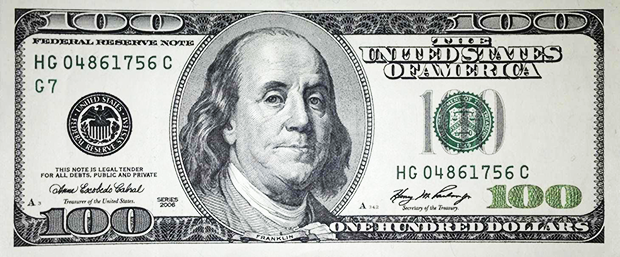All about the Benjamins?

Geoffrey Kellow is an associate professor in Carleton University's Department of Political Science. His public lecture, All about the Benjamins? Benjamin Franklin on Almanacs, Autobiographies and Economic Education, takes place Monday, November 7, at Concordia.
Poor Richard Saunders helped make Benjamin Franklin a wealthy man.
Franklin’s Poor Richard’s Almanac was an American bestseller, running for 25 years and selling tens of thousands of copies. Despite its manifest success, Franklin decided to wrap up the almanac.
Enlightenment-era prophet
In the final edition, Franklin composed what would become the most famous of the essays that he attributed to Saunders, the fictional editor. Franklin prefaced the final almanac with “Father Abraham’s Speech,” which recounted Saunders’ encounter with a modern-day prophet preaching the Book of Poor Richard to an audience waiting for a market to open.
Father Abraham excoriates his audience with dozens of Poor Richard’s maxims and parables, all extolling the virtues of thrift and industry. Unfortunately, as both the long essay and Franklin’s larger enterprise ended, his audience remained unmoved. Abraham’s audience and Franklin’s readers merely “approved the doctrine, and immediately practised the contrary, just as if it had been a common sermon.”
A critical change in thinking
This melancholy wrap-up to years of work was out of character for Franklin, who was generally recognized as an eternal optimist and Enlightenment everyman. Nevertheless, I think it was critical.
It signalled a change in Franklin’s thinking about the press and popular education. Franklin’s essay on improvement suggested nothing so much as the intractability of habit. For a quarter century he had been publishing exhortations to industry, self-discipline and thrift.
Thousands had read his words, and they continued to practice the contrary. Reading it with this in mind, Franklin’s final almanac appears best understood not as the manifesto of the American free market it became but rather as announcing his philosophic pivot away from one heuristic mode and towards another, a turn that culminated in his extraordinary autobiography.
Guest lecture at Concordia
In treating this critical turn, my November 7 talk, All about the Benjamins? Benjamin Franklin on Almanacs, Autobiographies and Economic Education will consider the almanac, his autobiography and what they can tell us about economic and civic education, both in Franklin’s time and ours.
All about the Benjamins? Benjamin Franklin on Almanacs, Autobiographies and Economic Education takes place on Monday, November 7 at 4:15 p.m. in Room H-1145, Henry F. Hall Building (1455 De Maisonneuve Blvd. W.), Sir George Williams Campus.


